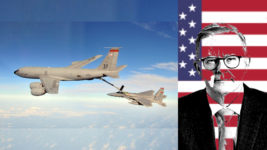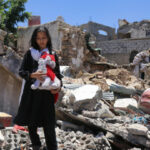Australia Assists United States to Attack Houthis in Yemen

Australia provided assistance to the United States in carrying out its 17 October 2024 attack against Houthi positions in Yemen. And it’s now apparent that ever-increasing US force posture on this continent, which is usually considered to be in aid of a future Washington-led war on China, can be of broad global service, as it’s now actively engaging in conflict in the Middle East.
Australia providing support to US forces in launching air strikes upon Houthi underground weapons facilities, which included the use of B-2 stealth bombers, makes certain that our nation is actively engaged in ongoing US assaults upon Yemen.
This, however, has been the case since we joined Operation Prosperity Guardian in January 2024, and then assisted in the initial US attack weeks later.
Another clear as crystal aspect to the Australian assistance provided to the US air force, of which our nation’s air force has becoming increasingly interoperable since 2014, is there has been no official public discussion of this nation’s assistance in an act of war, neither has there been any parliamentary debate, nor, it would appear, any sitting of the committee that holds war powers.
But what isn’t so transparent is what the assistance provided to US forces actually consisted of, as the ABC had originally reported that a Northern Territory base had been the “staging post” for the attack, which was later updated to “access and overflight” support “for US aircraft in northern Australia”, while other sites suggest US tanker aircraft launched from here to refuel US jets air-to-air.
US force postures are go
Independent and Peaceful Australia Network (IPAN) spokesperson Justin Tutty told Sydney Criminal Lawyers that the “heavy speculation” is that USAF tanker aircraft sited in Cairns were involved in launching from Australia and then assisting in the refuelling of US aircraft bound for Yemen, and he adds that the provision of it shows this country actively involved in US warring in the Middle East.
“Australian involvement highlights the hollow domestic rhetoric, because actions speak louder than words,” Tutty outlined.
“Twice in the last 12 months, Australia has supported a Gaza ceasefire vote at the UN.” But unlike other nations that “have backed that vote by expelling and recalling respective ambassadors, cutting mil-tech trade, and even other exports”, we’ve done little else.
The IPAN founder further asserts that these recent actions show Australia “now directly implicated in the growing warzone with the significant decision to permit northern air bases to provide support to this week’s attack by US B-2 bombers on Houthis in Yemen”. And Australian support came at the same time as the US was deploying more than 100 troops to Israel: its first soldiers on the ground.
“This unprecedented move illustrates a great risk of the growing US military presence in Australia,” the Darwin-based antinuclear activist further underscored. “The Force Posture Agreement has given the US unimpeded access and control at gazetted sites allowing it to take actions that implicate Australia in global conflict, regardless of the will of the Australian people, or even the parliament.”
Sending a message regardless
The United States official line on how the operation to strike Yemen played out is that the long range B-2 stealth bombers and other aircraft involved flew out from Whiteman Air Force Base in the US state of Missouri, and this likely involved a roundtrip of the entire globe, however there had been speculation that an Australian base could have been used as an alternative landing site afterwards.
B-2 stealth bombers have been visiting Australia regularly from the US over past years. In 2022, four were deployed to RAAF Base Amberley in Queensland, and several B-2s flew out to Australia from Whiteman in August this year. B-2 bombers were used in the US strike on Houthis as they were attempting to hit underground facilities, and these aircraft can carry the massive bombs required.
The US has launched airstrikes periodically upon Yemen beginning in January, in response to Houthi forces having been attacking commercial shipping vessels in the Bab el-Mandeb Strait – over 80 ships since October last year – that were bound for Israel via the Red Sea. The Houthis have been disrupting Israeli supply lines in direct opposition to the genocide Tel Aviv is perpetrating in Gaza.
The reason why the US took this moment to use such sophisticated weaponry upon targets in Yemen is the “bunker busting” attacks were supposed to act as a warning to Iran. And while Labor MP Luke Gosling told the ABC that “no deliberate messages were being sent by Australia”, Tutty doesn’t consider this distinction between messages sent by the two nations can be drawn.
“This action is widely seen as sending a message to Iran,” the IPAN founder advised. “But it also carries messages to other actors in the region.”
“Let’s consider the message these strikes send to Israel, whose atrocity crimes in Gaza have now ignited conflict with Lebanon. The strikes on Yemen send the clear message that Australia believes that what the region needs right now are more bombs.”
Sides have been taken
IPAN is warning that despite any announcement from government or debate in parliament, Australia is now directly implicated in the Middle Eastern warzone via the use of northern airbases, which appears not to have been in the form of a launching pad, but we are indeed intimately involved in ensuring that the mission was able to meet its success.
The peace network also highlighted that Gosling’s comments involved our nation clearly taking sides in this conflict, as the Labor MP was heard to remark that Australia was “obviously part of a global effort” to ensure that “terrorists” don’t “threaten the lives of Australians” “so, of course, we work with our allies and our partners to achieve that aim”.
The antiwar activist further pointed out that IPAN considers Australia must draw back from engaging in this conflict and ensure that Australian facilities aren’t made available for attacks on Middle Eastern targets.
“In addition, Australia should cut diplomatic ties with the Likud regime, and we must decisively end all bilateral mil-tech trade with Israel, until ceasefire graduates from lip service to reality,” he said in conclusion.







